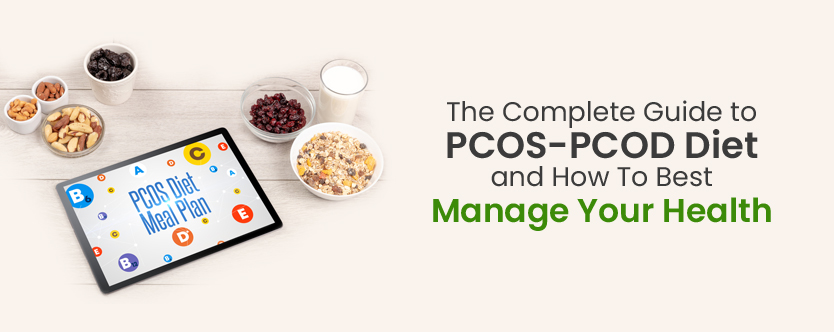
The Complete Guide to PCOS/PCOD Diet and How To Best Manage Your Health
PCOS/PCOD is a metabolism & hormonal imbalance-borne condition. With one in ten women suffering from PCOS, it is becoming the most occurring condition. Yes, PCOS is common. And, while a perfect remedy for it is yet to be found, some researchers suggest that a well-crafted PCOS diet plan in conjunction with sleep & stress management, exercise can do wonders to combat the issues caused by the condition.
PCOS creates ovarian cysts that lead to irregular periods, high levels of male hormones, excess hair growth, and acne. But, one of the most ailing effects of PCOS is weight gain and difficulty losing weight.
A well-balanced diet here affects PCOS in two ways: Weight management and insulin production & resistance. Out of these, insulin plays a significant role in PCOS, so managing insulin levels becomes essential to manage this condition.
When you have a diet that caters to your nutritional needs, it helps maintain a healthy weight and promotes good insulin levels, thereby making you feel good in general. Even though there is no specific diet that works for everyone with PCOS, there are some foods that everyone can benefit from.
Essentials for your PCOS and PCOD Diet Plan
-
Fibre enriched foods
To improve overall health & aid in weight loss
Sources: Barley, oatmeal, beans, almonds & other nuts, fruits, and vegetables (broccoli, cauliflower, beans, sweet potatoes, pumpkin.) Green leafy vegetables are especially recommended for weight loss as they are rich in iron, potassium, calcium, and Vitamin K, C, E, and B. Colored vegetables, on the other hand, contain antioxidants and reduce oxidative stress in PCOS patients. -
Anti-inflammatory foods
It would include food rich in prebiotics, fibre, antioxidants, and omega-3s.
Sources: Vegetables; tomato & spinach, whole grains, legumes, almonds & walnuts, olive oil, turmeric & cinnamon are the best sources. You can also have fruits with a low glycemic index like guava, pears, strawberries, blueberries, kiwifruit, apples, oranges, and watermelons. They cut excessive sugar consumption & provide several minerals, poly nutrients, and fibre. -
Good fats
There are bad fats & then there are good fats too that your body needs to absorb various vitamins. Some of its sources are seeds, olive oil, avocado, and nuts.
Foods that should stay away from your PCOD PCOS diet plan
- Red meat, fried, processed foods, and aerated drinks: consumption of these may cause inflammation in the body.
- Ice creams, cakes, pastries, white potatoes, sugary desserts and drinks, sugary snacks, muffins, white bread, and all items made of white flour: These food items increase insulin resistance.
A well planned PCOS diet should look somewhat like this
Do not follow any diet plan without expert consultation. Talk to your doctor or nutritionist and get a complete analysis of what needs to be in your diet.
- Early Morning (Empty stomach): A glass of methi seed-infused water or green juice.
- Breakfast: 1 cup green vegetables+whole grain chapati or upma, ragi idli, etc.
- Lunch:
- Evening Snacks: Puffed Rice/Roasted Chana. You can have tea/coffee/juice without added sugar.
- Dinner: 1 Cup Quinoa or Oats+1 Millet Roti or one bowl each of brown Rice dal & vegetables
Few tips from our bag
- Do not skip your breakfast as there are chances of overeating during mid-day meals, which may cause weight gain.
- Women suffering from PCOS should have a nutritious packed breakfast devoid of any bad carbohydrates & inflammation-causing ingredients.
- Try to drink water thirty minutes before your meal. It will help you curb appetite & make you feel full.
- Chew your food properly as this would help you in digestion & reduce the chance of insulin resistance and thus weight gain.
- Make sure to have dinner at least 2 hours before going to bed. Late dinners hamper the digestion process and ultimately disturb your sleep, and the body loses its natural rejuvenation process.
Lifestyle tips you need to put into action
While a proper diet plan for PCOD has a significant role in fighting its symptoms, it cannot serve the whole purpose. You need to have a healthy & energized body that you can achieve by following the outlined lifestyle tips.
-
Physical activity
Exercise is key to maintaining good health & achieving peace of mind. You don’t need to go overboard with it. Half an hour of exercise is enough to lose weight & be physically and mentally fit. You can include various forms of workouts like cardio, weight training, and yoga. Yoga is one of the most recommended for PCOS as it leaves a calming effect on your mind, body & soul and helps reduce stress levels.
-
Sufficient Sleep
A sleep-deprived person tends to eat more in a day than one taking proper sleep. As a result, they gain more weight & are more prone to get affected by PCOS.
-
Say no to unhealthy junk food
Processed foods contain high amounts of salt, sugar & preservatives, trans fat, which can harm your body in many ways & may lead to increased blood pressure, trigger diabetes & cause weight gain. Once in a while is ok but try to avoid these foods as much you can.
-
Stay Positive
It is essential to keep a positive attitude when working on a healthy lifestyle to get the desired results!
Untreated PCOS can be devastating and give birth to multiple health problems & make you feel frustrated at times. Taking proactive steps regarding your health by incorporating a balanced PCOD diet plan, exercise with some medication (if required) can lift your mood & spirits high and reduce symptoms.
The post The Complete Guide to PCOS/PCOD Diet and How To Best Manage Your Health appeared first on Health Total.
from Health Total https://www.health-total.com/pcod-articles/the-complete-guide-to-pcos-pcod-diet-and-how-to-best-manage-your-health/
Comments
Post a Comment